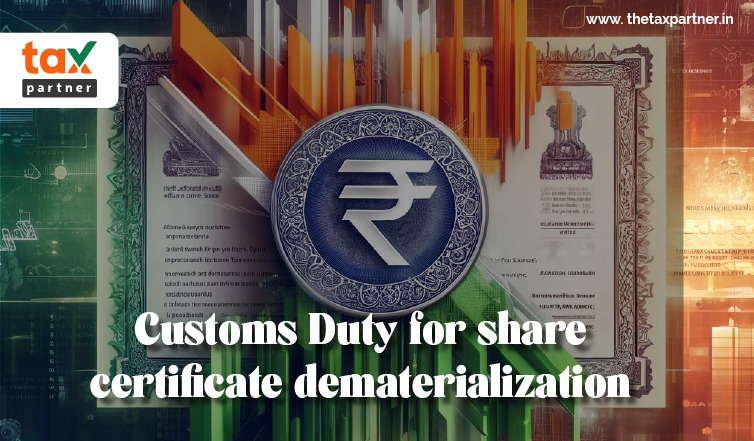Understanding Customs Duty for Share Certificate Dematerialization
Understanding Customs Duty for Share Certificate Dematerialization
Author- Tanvi Thapliyal
The Indian government recently mandated the dematerialization of shares of private enterprises in an effort to modernise and simplify the country's share ownership procedure. With regard to the ownership and trading of shares, this mandate represents a dramatic change that will mostly affect private company shareholders, especially foreign investors and Non-Resident Indians (NRIs).
In the past, physical certificates signifying ownership of a company's shares were issued. But in order to make the shift to dematerialization, these physical share certificates must be converted into electronic or digital format. This will do away with the need for physical paperwork and enable more seamless transactions.
Dematerialization mandates have a number of effects for shareholders, particularly international investors and non-resident individuals. First off, through digitising the procedure, cutting down on paperwork, and lowering the possibility of physical certificates being lost or damaged, it improves efficiency and transparency in share ownership. This action is in line with global financial market modernization and digitalization trends.
Furthermore, by guaranteeing a more reliable and safe system for shareholding, the dematerialization mandate fosters investor confidence and trust in the Indian capital market. Shares can be readily tracked and managed by investors through digitization, increasing accessibility and convenience.
The dematerialization mandate eases the process of participating in Indian enterprises for international investors and non-resident Indians (NRIs) by streamlining shareholding procedures and lowering administrative expenses. Additionally, it encourages a deeper level of foreign investment integration into the Indian economy, which boosts economic development and progress.
Classification and Tariff Rates for Customs:
The appropriate customs tax rates for imported share certificates are largely dependent on the customs tariff classification. There are differences in the classification based on the import mode, such as luggage versus courier mode.
Courier Mode:
-
Share certificates imported into India through the courier mode are categorised as item 49070090 in the customs tariff. Various printed materials, such as periodicals and documents, fall under this category.
-
For goods covered by tariff item 49070090, the relevant rate of customs duty is 24.32%. Share certificates imported via courier services are subject to this cost.
Luggage:
-
Customs duty item 98030000 applies to share certificates imported in luggage. Personal goods and belongings imported by travellers fall under this category.
-
For goods covered by tariff item 9803 0000, the relevant customs tax rate is 38.5%. Share certificates that are imported as part of a passenger's luggage are subject to this higher rate.
It's crucial to remember that the prices and classification described above apply only to the import of share certificates used for dematerialization. Different categories and duty rates may apply to other commodities.
When determining the customs duty responsibilities for imported share certificates, it is crucial to comprehend the mode of import, as demonstrated by the variations in categorization and rates. In order to guarantee compliance with customs legislation and prevent any potential financial liabilities or conflicts, importers including non-resident individuals and foreign investors should be aware of these factors.
Exemption from Customs Duty
In order to facilitate dematerialization, the Central Board of Indirect Taxes and Customs (CBIC) has granted permission for the re-importation of share certificates into India. The purpose of this exemption is to lessen the financial burden on importers, especially foreign investors and NRIs, and to expedite the dematerialization process.
Notification of Exemption:
On June 30, 2017, Notification No. 46/2017-Customs was issued, granting an exemption from paying appropriate customs duty. This notification clarifies the customs duty exemption for the re-import of share certificates and replaces the previous notification (No. 94/1996-Customs, dated 16.12.1996).
Requirements to Utilise the Exemption:
To be eligible for the customs duty exemption on the reimportation of share certificates into India, importers must meet specific requirements. These requirements are laid forth to make sure that the right paperwork and customs laws are followed.
Essential prerequisites:
-
Reimporting must take place no later than three years (plus two years) following the date of export.
-
This timeline gives importers enough leeway to finish the dematerialization procedure and re-import the share certificates in a fair amount of time.
-
Share certificates had to be exported at the time a shipping bill was filed. By ensuring that the export of share certificates is accurately recorded and documented, this criterion makes the re-importing procedure easier.
-
Customs officials may specify extra documentation requirements, such as proof of export and compliance with applicable customs procedures, which importers must comply with.
Documentation Requirements:
In order to receive the customs duty exemption for the re-import of share certificates, importers usually need to provide a number of documentations. These consist of:
-
Evidence of export proving the share certificates were shipped out of India for dematerialization, such as a copy of the export declaration or shipping bill.
-
Any extra paperwork required by customs officials to confirm adherence to exemption requirements.
-
In order to enable the re-importation of share certificates and guarantee a seamless customs clearance process, importers should keep correct records and paperwork throughout the dematerialization process.
Problems with Valuation
In order to determine the value of share certificates for customs duty purposes, both the certificate and the underlying shares must be valued. Determining the customs duty obligations related to the importation of share certificates into India for dematerialization depends on this value. However, importers may face difficulties in the valuation process because to its complexity, particularly if various techniques of value produce different outcomes.
Value of the Share Certificate:
-
When calculating customs duties, the share certificate's value is a crucial factor. This amount could depend on a number of things, including the certificate's printing costs, administrative costs, and any related fees or levies.
-
In order to compute the amount of customs duty that must be paid, importers must precisely ascertain the share certificate's worth. Invoices, receipts, or other pertinent documentation may serve as documentation for this value.
The Underlying Shares Value:
-
Customs authorities may take into account the value of the underlying shares represented by the certificate in addition to the certificate's value.
-
Usually, this valuation is determined by taking into account any relevant discounts or premiums in addition to the market price of the shares at the time of import.
-
To support their customs declarations, importers may be required to submit proof of the shares' market worth, such as stock exchange quotations or expert financial estimates.
Challenges and Implications
-
Determining an accurate and fair value is one of the main obstacles in evaluating share certificates for customs duty reasons.
-
Variations in the outcomes of different systems of valuation could result in disparities in the amount of customs duties owed.
-
Getting trustworthy and verifiable value data can be difficult for importers, particularly when it comes to shares of privately held firms or securities with limited trading volumes.
-
Liabilities for customs duties may also be significantly impacted by the valuation method selection. For instance, compared to utilising the market value, using the face value of the shares or their intrinsic value may result in a lesser customs duty burden.
-
In order to maintain compliance with customs legislation and valuation standards, importers must carefully analyse the effects of various valuation methodologies on their customs duty responsibilities.
Implications for Importers in Practice:
In order to efficiently handle the customs duty duties, Non-Resident Indians (NRIs), foreign people, and organisations preparing to ship share certificates to India for dematerialization should take into account a number of practical insights and considerations. Here are some important things to think about.
-
Knowing Your Customs Duty Obligations: When importing share certificates into India for dematerialization, importers need to be fully aware of their customs duty responsibilities. This entails knowing the rates of customs duty, the applicable customs tariff classification, and any applicable exclusions.
-
Documentation and Compliance: In order to support their customs declarations, importers must make sure that all customs laws are followed and that appropriate documentation is provided. Invoices, shipping documents, export certification, and any other pertinent documentation may be included in this.
-
Timely Re-Importation: When re-importing share certificates into India for dematerialization, importers must follow the deadline. If you don't re-import within the allotted time, you can lose your eligibility for customs duty exemptions and face additional financial obligations.
-
Value Considerations: When valuing share certificates for customs duty reasons, importers should take the value of the underlying shares as well as the certificates themselves into account. To reduce the possibility of disagreements, it is crucial to record the valuation procedure and provide evidence for the method that was used.
-
Risk management: To identify potential risks and liabilities related to customs duty duties, importers should carry out a complete risk assessment. This could entail estimating the possibility of valuation disputes, customs audits, or delays in customs clearance.
-
Getting Professional Advice: Customs brokers, solicitors or tax advisors may be able to provide importers with helpful guidance, particularly if they are not familiar with Indian customs laws. These experts can offer advice on risk management techniques, valuation concerns, and compliance requirements.
-
Keeping Records: All import-related transactions, including records of customs clearance, valuation, and customs duty payments, should be kept up to date by importers. Maintaining accurate records is necessary to prove compliance and address any questions or audits from customs officials.
-
Emphasising Possible hazards and Liabilities: When bringing share certificates into India for dematerialization, importers need to be mindful of the possible hazards, legal issues, and monetary responsibilities related to customs duty duties.
Liabilities and dangers to take into account are:
-
Customs tax Payments: If importers do not meet any exemption requirements or if the customs valuation of their imported share certificates deviates from their declared value, they may be required to pay customs tax on those certificates. If customs duty is not paid, there may be fines, penalties, or goods seizure.
-
Valuation Disputes: When valuing share certificates for customs duty reasons, importers may get into disagreements with customs authorities. Conflicts over declared values or methods of valuation may cause delays in the passage of customs or result in extra costs.
-
Penalties for Non-Compliance: Customs officials have the authority to impose fines or penalties for non-compliance with their regulations. This includes things like not meeting re-importation dates or providing appropriate documentation.
-
Operational Delays: Importers may suffer financial losses and operational disruptions as a result of value disputes, non-compliance difficulties, or delays in customs clearance. It is imperative to adhere to customs laws with precision and timeliness in order to prevent delays and minimise related hazards.
Conclusion
Importers especially Non-Resident Indians (NRIs), foreign people, and businesses must carefully analyse their customs duty duties in light of India's dematerialization of share certificates. To efficiently navigate the import process and reduce potential hazards, it is essential to comprehend the consequences of customs law and the applicable rates. The various customs duty classifications and rates that apply to share certificates imported through courier services or as part of luggage must be understood by importers. Additionally, subject to specific requirements, the Central Board of Indirect Taxes and Customs (CBIC) grants a customs duty exemption for the re-importation of share certificates into India for dematerialization. Importers must precisely determine the value of share certificates and the underlying shares in order to handle valuation difficulties, which also require careful study. Importers must maintain correct documentation, follow re-importation deadlines, and, when needed, seek professional assistance in order to assure compliance and reduce risks. Importers can ensure regulatory compliance, streamline the import process, and effectively manage customs duty liabilities by adhering to these best practices and guidelines.
FAQs:
Q: What is the dematerialization of share certificates in India?
A: Dematerialization refers to the process of converting physical share certificates into electronic or digital form. It aims to modernize and streamline shareholding processes by eliminating the need for physical documents.
Q: Why is dematerialization important for shareholders in India?
A: Dematerialization enhances efficiency, transparency, and security in share ownership by digitizing the process, reducing paperwork, and minimizing the risk of loss or damage to physical certificates.
Q: What are the customs duty implications for importing share certificates into India for dematerialization?
A: Share certificates imported into India are subject to customs duty, with rates varying depending on the mode of import (courier mode or baggage). Importers must understand these implications to ensure compliance and mitigate risks.
Q: Is there an exemption from customs duty for re-importing share certificates into India for dematerialization?
A: Yes, the Central Board of Indirect Taxes and Customs (CBIC) provides an exemption from customs duty for the re-importation of share certificates, subject to certain conditions.
Q: What are the conditions for availing the customs duty exemption for re-importation of share certificates?
A: Importers must re-import the share certificates within a specified timeframe (typically three years from the date of export), ensure the export was made on filing a shipping bill, and fulfill any additional documentation requirements specified by customs authorities.
Q: How should importers determine the value of share certificates for customs duty purposes?
A: Importers should carefully consider the value of the share certificates themselves and the underlying shares they represent. Documentation such as invoices, receipts, and valuation reports may be used to support the valuation process.
Q: What are the potential risks and liabilities associated with customs duty obligations for importing share certificates into India?
A: Risks include customs duty payments, valuation disputes, non-compliance penalties, and operational delays. Importers must mitigate these risks by ensuring compliance with customs regulations and maintaining accurate documentation.



